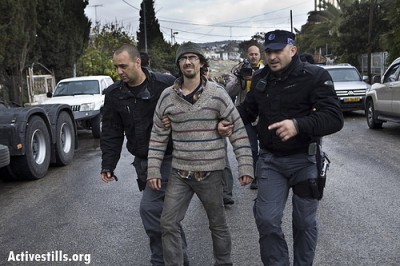-
Journalist arrested at peaceful tree-planting action
Christian Peacemaker Team 23 January 2010 On 23 January, Israeli soldiers declared Palestinian land south of the Israeli settlement outpost Havot Ma’on (Hill 833) a closed military zone, then arrested a Palestinian journalist from Pal Media. The journalist was reporting on a demonstration organized by Palestinians from the village of At-Tuwani after the recent destruction […]
-
Activist Ryan Olander released from immigration detention
International Solidarity Movement 23 January 2010 As the sun set behind watchtowers and barbed wire fences at Ramle prison Thursday January 15th, Ryan Olander emerged from the steel auto locking door and into the unrestricted air. Ryan had just spent 29 days locked in the Givon immigration detention center located in Ramle, Israel following his […]
-
CJPME: Canada to withdraw its funding to UNRWA
Canadians for Justice and Peace in the Middle East 21 January 2009 Last week, the government of Canada quietly announced it would discontinue its long-standing financial contributions to the United Nations Relief and Works Agency (UNRWA), and redirect the monies to strengthen the judicial system of the Palestinian Authority and other food assistance programs. The […]
Action Alert An Nabi Saleh Apartheid Wall Arrests BDS Bethlehem Bil'in Cast Lead Demonstration Denial of Entry Ethnic Cleansing Farmers Gaza Global Actions Hebron House Demolition International law Israeli Army Jerusalem Live Ammunition Nablus Ni'lin Prisoner Ramallah Rubber-coated steel bullets Settlement Settlers Settler violence Tear-Gas Canister Video

